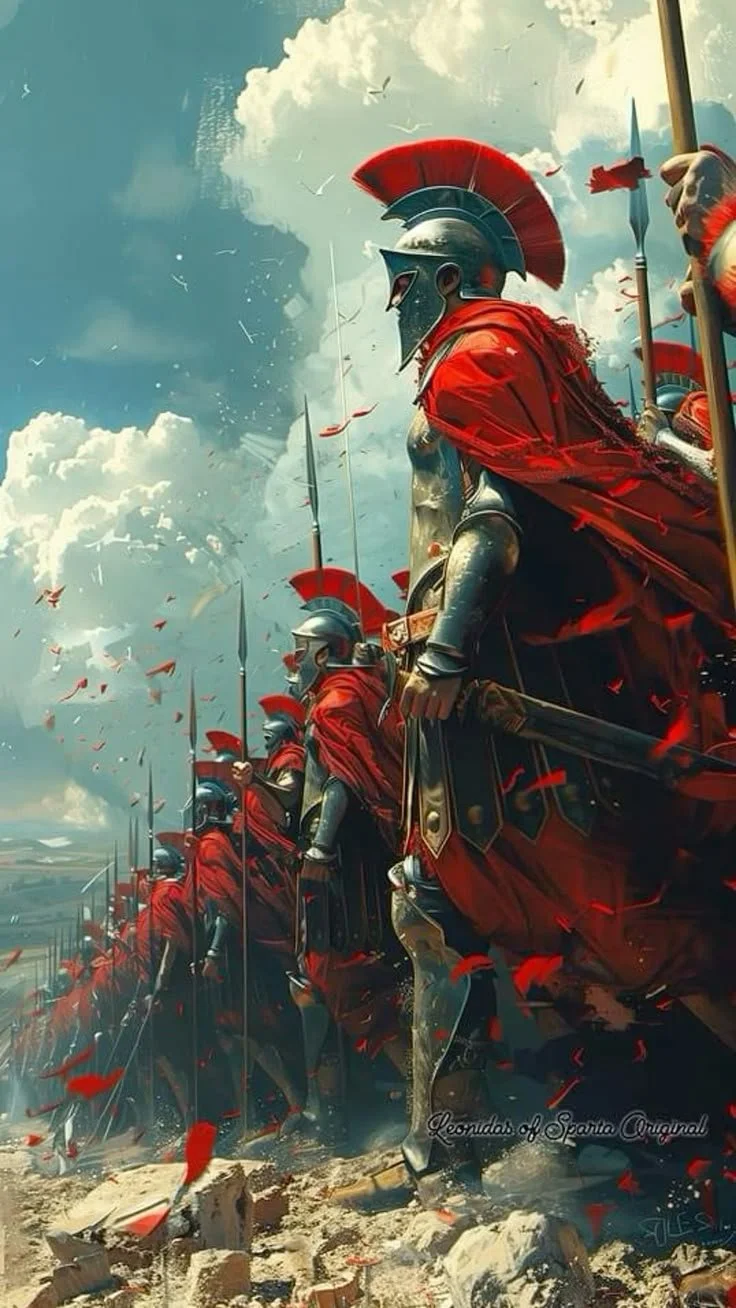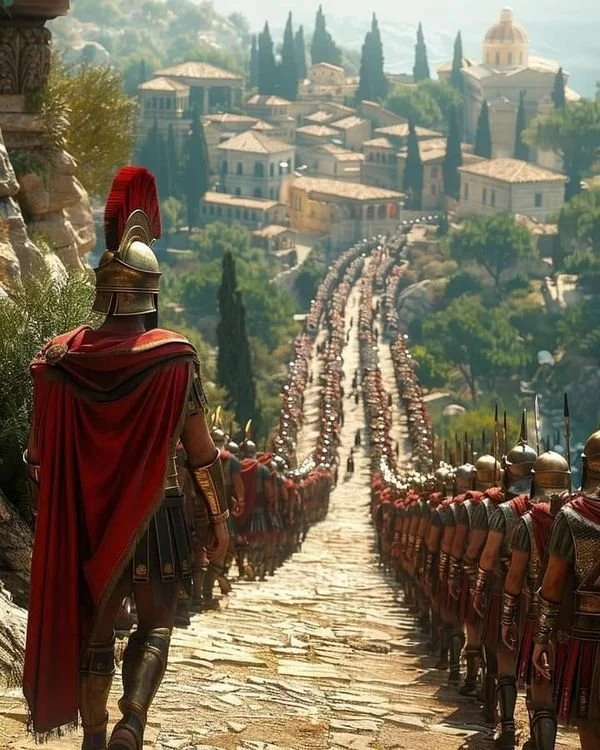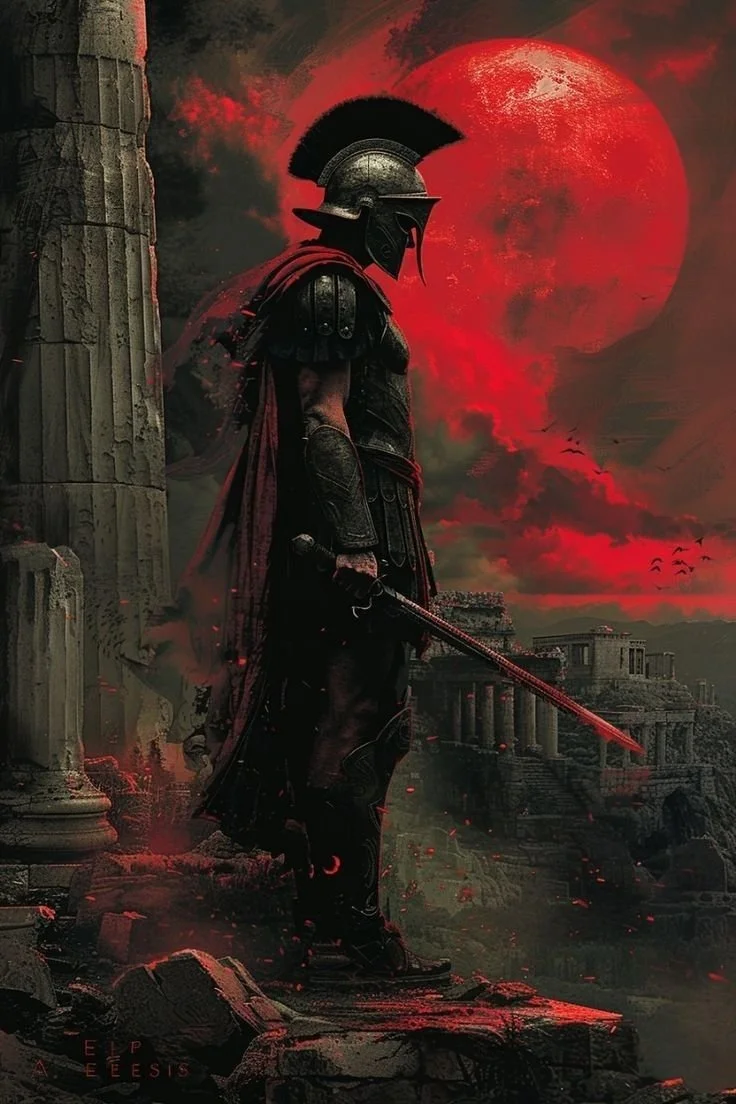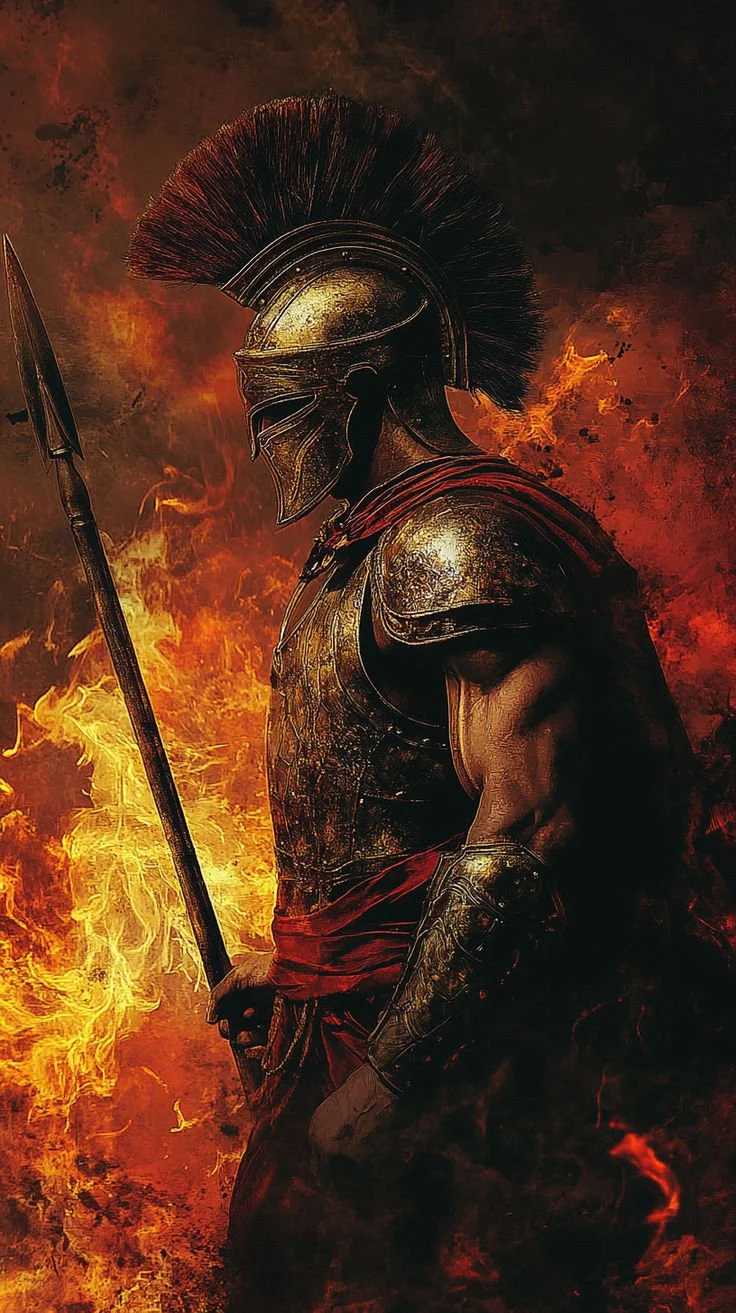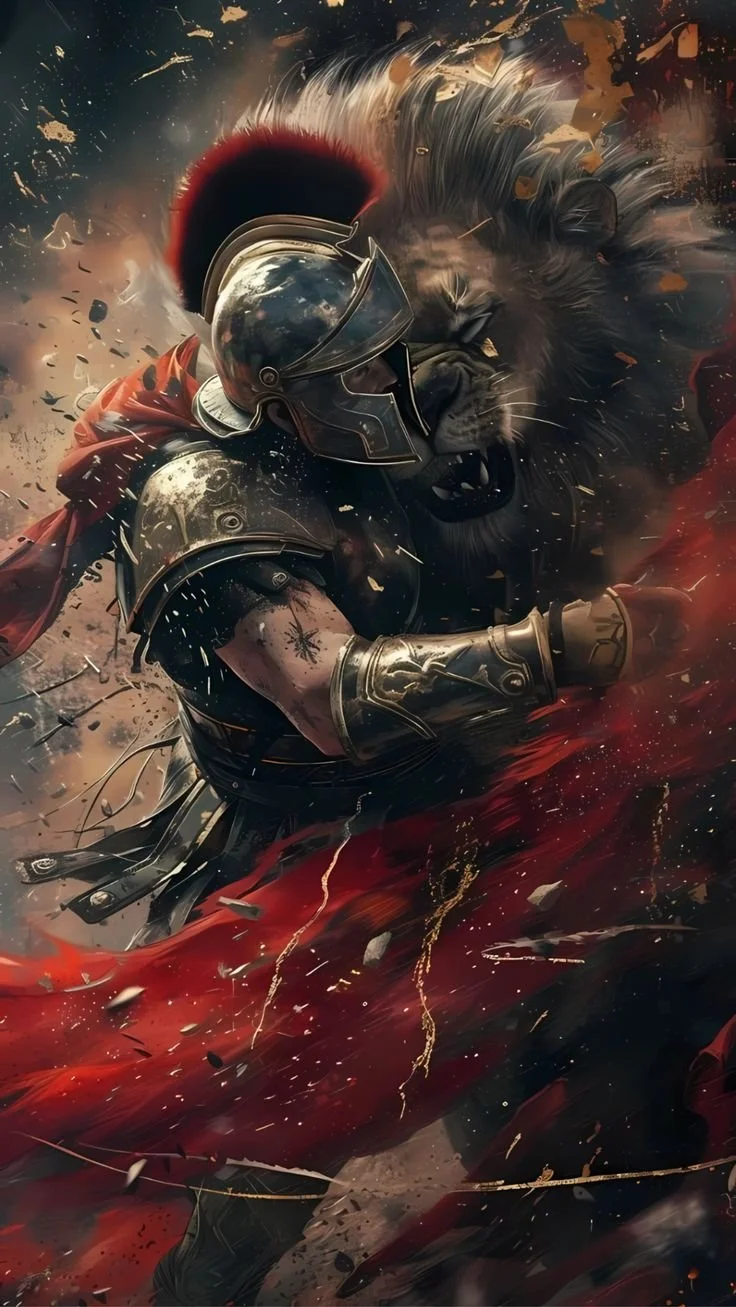Sparta
The City of Lacedaemon Lakedaimon
-
Sources: https://www.thebyzantinelegacy.com/sparta https://www.artofmanliness.com/character/military/the-spartan-way-the-mindset-and-tactics-of-a-battle-ready-warrior/ -
Lacedaemon (Lakedaimon) was the Byzantine name for both the region of Laconia and its capital Sparta. While Sparta expanded during the Roman era, it began to contracted in late antiquity and a limited area was fortified. The foundations of three churches of this period have been found, as have various objects, including clay lamps dating to the 6th century.
-
The region began to decline by the late 6th century, perhaps due to pressure caused Slavic invasions. The Chronicles of Monemvasia reports that its citizens left their city under pressure of the Slavic invasions and settled in Sicily. Nicephoros I (802-811) rebuilt the polis of Lacedaemon and had a "mixed population" settle there.
-
The early history of the bishopric of Lacedaemon is unclear. The first known bishop, Hosios, is attested in 458; then, in 681, when the city was supposedly abandoned, when a bishop of the polis seems to be mentioned. Records again refer to the bishopric of "Lakedeon" in the Peloponnese around 800.
-
The vita of the 10th century saint Nikon the Metanleite, who lived in Lacedaemon, provides rich information about the city and its environs, including the existence of a Jewish community and pagan Slavs. The city is described as large and flourishing in the 12th century. An 11th-12th century bath been excavated at Sparta, while coins of Constantine VII and polychrome ceramics have been found on the acropolis. Lacedaemon was elevated to the status of metropolis in 1083.
-
At its peak, the Spartan army was the most dominant, and feared, military force in ancient Greece, and its prowess was built on the singular mentality and strategy it brought to the art of war.
-
There Is Power in Appearance
Spartan men not only had the skills and training to back up their reputation as formidable warriors, they enhanced that reputation — and their efficacy on the battlefield — by cultivating an external appearance that matched their internal prowess.
-
Spartan warriors were clothed in a scarlet tunic and cape (discarded prior to battle). The latter statement gave rise to the apocryphal idea that red was also chosen because it hid blood better — concealing a wound, and a weakness, from the enemy. Over his tunic and hung from his arm the Spartan hoplite carried armor and a shield which had been buffed to a brilliant shine and glinted in the sun.
-
Spartan men wore their hair long — a style which had once been common all over Greece, but which Lacedaemonians held onto after other city-states had shifted to shorter cuts. For the Spartans, long hair symbolized being a free man, and they believed, Plutarch says, “that it made the handsome more comely and the ugly more frightful.” The Spartans kept themselves well-groomed, often braiding these long locks, and keeping their beards neatly trimmed as well.
-
Atop their heads was placed a crowning piece of equipment which the narrator of Steven Pressfield’s Gates of Fire (a work of historical fiction accurate in many details) describes as the “most frightful of all”:
“Adding further to the theater of terror presented by the Hellenic phalanx . . . were the blank, expressionless facings of the Greek helmets, with their bronze nasals thick as a man’s thumb, their flaring cheekpieces and the unholy hollows of their eye slits, covering the entire face and projecting to the enemy the sensation that he was facing not creatures of flesh like himself, but some ghastly invulnerable machine, pitiless and unquenchable.”
The formidable appearance of the Spartan helmet was further enhanced by the fact it was “overtopped with a lofty horsehair crest which as it trembled and quavered in the breeze not only created the impression of daunting height and stature but lent an aspect of dread which cannot be communicated in words but must be beheld to be understood.”
-
The power of the Spartans’ appearance softened up the enemy line before they even hit it, and added to a reputation for strength that sometimes deterred enemies from even going to battle against them at all.
-
Always Perform a Pre-Battle Ritual
“Keep your men busy. If there is no work, make it up, for when soldiers have time to talk, their talk turns to fear. Action, on the other hand, produces the appetite for more action.” —Gates of Fire
-
In Herodotus’ Histories, he writes that during the lead up to the battle of Thermopylae, King Xerxes, ruler of the Persian empire, “sent a mounted scout to see how many [Spartans] there were and what they were doing.” What did the scout observe? “He saw some of the men exercising naked and others combing their hair.”
-
Before battle, Spartan warriors kept their nerves at bay by staying busy with various tasks and physical rituals. In their youth, they had memorized verses of the poet Tyrtaeus, which they recited to themselves and sang and chanted as they marched on campaign. In the days prior to battle, they exercised before breakfast, had further military instruction and training after eating, and engaged in exercise and athletic competitions in the afternoon. During moments of repose, the men dressed and groomed their hair, and polished the brass exteriors of their shields.
-
When the time came to march on the enemy, the playing of a flute allowed the Spartans to perfectly keep time, and as a result of this music, as well as their other tension-reducing, courage-buoying rituals, they advanced upon the enemy in a slow, steady procession, which only added to the intimidation factor.
-
A Warrior Can Be Both Fierce and Reverent
We’re apt to think of the Spartans as ferocious, cocksure warriors. But while no fighting force could be more easily excused for relying entirely on their own strength and abilities, the Spartans were in fact acutely cognizant of, and humbled by, the existence of forces greater than themselves.
-
The Spartans were an extremely reverent people. “From an early age,” Paul Rahe writes, they were “imbued with a fear of the gods so powerful that it distinguished them from their fellow Greeks.” Indeed, piety served as “the foundation of Spartan morale.”
-
Before embarking on a campaign, every morning while on it, and immediately preceding battle, oracles were consulted, sacrifices were made, and omens were examined. The sanction, or censure, of the gods was sought for every decision.
-
So too, religious obligation came even before martial duty. The Spartans delayed sending a deployment to the Battle of Marathon because the call came in the middle of a religious festival. For the same reason, Leonidas sent only a small advance guard to Thermopylae instead of Lacedaemon’s main force.
-
The reverence of the Spartans could be called superstition, but it could also be called humility — an awareness of, and respect for, the forces of fate that ultimately, no matter one’s skill and preparation, can influence the outcome of an endeavor and cannot be wholly controlled.
-
Endurance Is the Foundation of Strength
In phalanx warfare, agility, cleverness, and speed were not as important as grit, fortitude, and stamina — sheer endurance. The lines of hoplite soldiers pressed forward with their shields, seeking to push back the enemy line, breach its ranks, and trigger a retreat. The virtues most needed by a Spartan warrior then were commitment, discipline, and the fortitude required to stand one’s ground and grind it out. Courage was certainly needed, but not the courage of intrepid boldness, but that which modern general George S. Patton called “fear holding on a minute longer.”
-
Once this is grasped, one can begin to better understand the rationale behind the agoge’s famous hardships: meager rations, limited bathing, a single cloak to wear year-round in all temperatures, beds made of reeds. And of course the endless rounds of vigorous exercise and sports. As Plato noted, Spartan training really amounted to a relentless series of endurance tests.
-
The end sought in such training was not hardship for hardship’s sake, but an adaptability, a tolerance for pain and for changing, challenging conditions — a mental toughness that bolstered physical toughness, and vice versa. The aim was to inculcate the kind of strength most needed by a Spartan warrior: that of being able to hold the line under pressure. As Patton put it: “A pint of sweat saves a gallon of blood.”
-
Speak (and Think) Laconically
The Spartan philosopher Chilon — one of the Seven Sages of Greece — famously said that “less is more,” and this was a maxim that guided the whole ethos of Lacedaemon — from its buildings to its citizens’ clothing and diet. Indeed, “Spartan” today remains a descriptor synonymous with simplicity, austerity, and frugality — a comfort with discomfort and a disdain for luxury.
Read More Seven Sages
-
The “less is more” principle also governed the language of the Spartans, who took a minimalist approach to speech which today we still refer to as “Laconic.” The ideal was to speak only when one had something important to say, and then only in short, terse bursts, pithy sayings, and the sharp, clever replies that characterized Laconic wit. The Spartans honed their words until they were as sharp as their spears — and just as sure to find their mark.
-
For example, legend has it that when Philip II sent a message saying, “If I enter Laconia, I will raze Sparta,” the Spartans sent but a one-word reply: “If.” And of course there is the famous story of the soldier at Thermopylae who lamented to Leonidas that the Persians shot so many arrows that they darkened the sun. The warrior king’s reply? “Then we will fight in the shade.”
-
Socrates thought that the Spartans’ singular style of speech was a way of strategically getting others to underestimate them:
“they conceal their wisdom, and pretend to be blockheads, so that they may seem to be superior only because of their prowess in battle . . . This is how you may know that I am speaking the truth and that the Spartans are the best educated in philosophy and speaking: if you talk to any ordinary Spartan, he seems to be stupid, but eventually, like an expert marksman, he shoots in some brief remark that proves you to be only a child.”
It was also a field expedient way of speaking — you want to get straight to the point when yelling commands in the chaos of combat.
-
But the Laconic tactic of conserving speech may have also been a deliberate philosophical choice; as historian Karl Otfried Müller speculated, “A habit of mind which might fit its possessor for such a mode of speaking, would best be generated by long and unbroken silence.” That is, if one wishes to make what he says count, he is forced to be more reflective before opening his mouth.
-
Mastery
The Spartans did not dabble in warfare; it was the pursuit around which all culture — education, relationships, politics — was structured and disciplined. Citizens were barred from farming or practicing a trade, and even from possessing gold or silver coins; without the distractions of commerce and material acquisition, they could concentrate wholly on mastering the way of the warrior. Rahe writes:
“The Spartans were, as Plutarch remarks, ‘the servants of Ares,’ not Mammon. They were ‘the craftsmen of war,’ not the makers of pots. They had but one purpose in life: to gain a reputation for valor.”
-
While the militiamen of other cities spent the months outside the fighting season as farmers or craftsmen or merchants, the Spartans were full-time soldiers. As Plutarch observed, “they were the only men in the world for whom war brought a respite in the training for war.”
-
Dedicating themselves wholly to their vocation, they became the best at what they did, with an advantage over those who were mere dilettantes in the martial arts; in an episode recounted by Plutarch, the Spartan king Agesilaus sought to convince Lacedaemon’s allies to join the polis in a war against Thebes, by essentially arguing that a single Spartan warrior was worth more than several men from other city-states:
“The allies said they had no wish to be dragged this way and that to destruction every year, they themselves so many, and the Lacedaemonians, whom they followed, so few. It was at this time, we are told, that Agesilaus, wishing to refute their argument from numbers, devised the following scheme. He ordered all the allies to sit down by themselves, and the Lacedaemonians apart by themselves. Then his herald called upon the potters to stand up first, and after them the smiths, next, the carpenters, and the builders, and so on through all the handicrafts. In response, almost all the allies rose up, but not a man of the Lacedaemonians; for they were forbidden to learn or practice a manual art. Then Agesilaus said with a laugh: ‘You see, men, how many more soldiers than you we are sending out.’”
-
As a result of this extraordinary focus on mastering a single domain — thirteen years of dedicated training, ten years of practice and real-life execution as a full-time soldier, and decades more of martial maintenance in the reserves — the ways of war become ingrained in the sinews of a Spartan soldier. Pressfield compares the preparation of this force with that of the militiamen mustered by other city-states:
“This process of arming for battle, which the citizen-soldiers of other poleis had practiced no more than a dozen times a year in the spring and summer training, the Spartans had rehearsed and re-rehearsed, two hundred, four hundred, six hundred times each campaigning season. Men in their fifties had done this ten thousand times. It was as second-nature to them.”
-
For the Spartans, courage was not a vulnerable and transitory state of mind, but the product of preparation and practice. In fact, they did not respect the solider who fought in an impassioned rage, believing such loud and belligerent posturing was used to hide one’s fear and lack of self-composure.
-
Instead, they sought to embody the ethos of “the quiet professional” who simply sets out to do his job, and lives the classic motto voiced by coaches like Vince Lombardi: “Act like you’ve been there before.” The courage of the Spartans was not born of feeling, but discipline. It was not an emotion, but a habit. Or as Pressfield observes in Gates of Fire, “War is work, not mystery.”
-
“And he who falls in the front ranks and gives up his spirit
So bringing glory to the town, the host, and his father
With many a wound in his chest where the spear from in front
Has been thrust through the bossy shield and breastplate
This man they will lament with a grievous sense of loss.”
“And disgraceful is the corpse laid out in the dust,
Thrust through from behind by the point of a spear.”
–Tyrtaeus
Read More Yamata no Orochi The Eight Headed Dragon Serpent Yamato Clan click
Read More Hashashin The Order of Assassins Nizari Ismailis Clan click
Read More Bushido Samurai The Way of The Warrior click
Read More Berserker Ulfhednar The Bear, The Wolf, The Boar Ancient Germanic Norse Clans click
Read More Knights Templar The Temple of Solomon Baphomet click
Read More Vlad The Impaler Count Dracula Order of The Dragon click
Read More Memnon The Nubian King of Aethiopia Ethiopia click
Read More Theseus The Athenian Hero Slayer of The Minotaur click
Ancient Rites - Thermopylae (300)
Lyrics
Sons of Laconia, under Lycurgian law
300 noblemen, ancient world in awe
Facing Xerxes might, no hope for victory
Still Persian blood coloured the Aegian Sea
Go, tell the Spartans, stranger passing by,
That here, obedient to their laws, we lie.
Lacedaemon's mothers gave birth to men,
Withstanding thousends again and again
None will behold the Eurotas Valley no more
This sacrifice needed to silence Persia's roar
No matter how fierce the spirit or mind
Blades striking, the kings' heart declined
Round he spun, and down he fell
No scream, no word, no cowardice yell
Symbolic sacrifice, all for the Hellenic land
Spartan codes of honour and inspiring guiding hand
No Spartiate soul left alive to tell
How bravely they fought, by treason they fell
Not a stone on their turf, nor a bone in their graves
They live on in history that immortally saves
Go, tell the Spartans, stranger passing by,
That here, obedient to their laws, we lie
Pictures Videos Music and Additional Reading
Legends of Sparta - Epic Music
"Thucydides describes the Spartans advancing to battle 'slowly, to the music of many pipers, as is their established custom, not for religious reasons but so that their approach should be even
and rhythmical and their line not broken, as tends to happen with large forces as they come forward'. Plutarch develops the picture further. When their battle-line was ready drawn up, with the enemy looking on, the king would slaughter the nanny-goat, giving the word for everyone to put on wreaths and telling the pipers to pipe the Castor tune, while he gave the lead in the marching paean. It was a solemn and terrifying sight to see them, stepping in time to the pipe, with no split in their line and no disturbance in their spirits, calmly and cheerfully following the music into mortal danger."
Epic Ancient Greek War Song: Echoes of Olympus (Double Extended)|Heroic Battle Music of Spartans
Lyrics Language is Greek translated into English
Zeus, the thunderbolt-bearer, have mercy on us!
In the clouds reigning, the storms of the untimely, hear!
Bring justice, mighty god, father of mortals and gods!
Shine with your thunderbolt, grant us the gift of struggle and victory!
Powerful wind, in your sky, glorious god!
Lightning shield, light of ruler, possessing power!
Wisdom, ruler, fight against injustice, guide of life!
Bless us, great Zeus, grantor of victory and peace!
Great power, shine on Olympus, Rhea of Cronus, son of Thermen!
Root-maker and sky-carver, grant us power and glory!
Our enemies, bow down to the storm, having been subdued by divine fire!
Great Zeus, your gifts are flying, shine upon us with eternal glory!
Zeus, the palace-bearer, bringer of thunder, have mercy on us!
In the clouds reigning, the storms of the sea, hear!
Sovereign God, you who strike great thunder, help us!
Banners and fire rise, give strength and glory
Zeus, the great thunderbolt, help us
In the clouds reigning, the storms of the sea, hear us
Rejoice, O multitude, the great father Zeus
Shine, illuminating the nights, this shining blazing star
Mind of men, great light of heaven, great Zeus, I come to us!
State of thunder and lightning, savior of all earth and air!
O Olympian King, sit on the throne, judge the peoples!
Divine Spirit, fire and light, cleanse our souls without blemish!
Zeus, the thunderbolt bearer, have mercy on us!
In the clouds reigning, the storms of the sea, hear!
Eternal glory, Zeus, yours, great Father!
Hands with me forever, in the winds stir, the beginning of the lightning!
Fathers of the world, Themistopolis, guide of wisdom!
Zeus, the thunderbolt bearer, have mercy on us!
In the clouds reigning, the storms of the sea, hear!
Sovereign God, you bring great thunderbolt, help us!
Command, Almighty, thunderbolt ruler, judge souls
Loose the bonds of the unjust, light in the night, be as old as the old
With your blessing, guide us, and grant wisdom to the young
Cover of Brotus, army of heaven, possessing great powers
Zeus, the palace, bringer of thunderbolts, have mercy on us!
In the clouds reigning, the storms of Anax, hear!
Zeus, the palace, bringer of thunderbolts, have mercy on us!
In the clouds reigning, the storms of Anax, hear!
Your light shines, steadfast in the cloudless sky
Wind-crowned, fire of thunder, our guide, father
The battle is broken, Rector, Zeus, holding the globe
The globe is my palm, and the earth is my shoulder, the dragon's shoulder holds
A great kingdom, gloriously and proudly reigns
Giver of trees, creator god, a revered throne
Eternal Zeus, great fire-bearer, guardian of the ages
Give us a lamp, precious power
Zeus, palace-bearer, bringer of thunder, have mercy on us!
In the clouds reigning, in the storms of the storm, hear!
Lacedaemon
Sources: https://occult-world.com/lacedaemon/ https://www.thebyzantinelegacy.com/sparta Lacedaemon (lake Demon) is in Greek mythology, son of Zeus and Taygeta, the daughter of Atlas; married to Sparta, the daughter of Eruotas, by whom he had Amyclas and Eurydice, the wife of Acrisius.
Lacedaemon introduced the worship of the Graces in Laconia and built a temple in their honor.
-
Lacedaemon (Lakedaimon) was the Byzantine name for both the region of Laconia and its capital Sparta. While Sparta expanded during the Roman era, it began to contracted in late antiquity and a limited area was fortified. The foundations of three churches of this period have been found, as have various objects, including clay lamps dating to the 6th century.
-
The region began to decline by the late 6th century, perhaps due to pressure caused Slavic invasions. The Chronicles of Monemvasia reports that its citizens left their city under pressure of the Slavic invasions and settled in Sicily. Nicephoros I (802-811) rebuilt the polis of Lacedaemon and had a "mixed population" settle there.
-
The early history of the bishopric of Lacedaemon is unclear. The first known bishop, Hosios, is attested in 458; then, in 681, when the city was supposedly abandoned, when a bishop of the polis seems to be mentioned. Records again refer to the bishopric of "Lakedeon" in the Peloponnese around 800.
-
The vita of the 10th century saint Nikon the Metanleite, who lived in Lacedaemon, provides rich information about the city and its environs, including the existence of a Jewish community and pagan Slavs. The city is described as large and flourishing in the 12th century. An 11th-12th century bath been excavated at Sparta, while coins of Constantine VII and polychrome ceramics have been found on the acropolis. Lacedaemon was elevated to the status of metropolis in 1083.
-
In the early 13th century the Franks took Lacedaemon, apparently without any difficulty, and it came under the control of the Principality of Achaia. William II Villehardouin spent the winter of 1248-49 there and in 1249 began construction of the castle at Mystras, west of the city.
-
Lacedaemon remained the urban center until warfare beginning in 1263 caused the inhabitants to flee to Mystras. Laconian frescoed churches include St. George at Longaniko, dated 1375, and St. Nicholas at Agoriane, built around 1300 and painted by Kyriakos Phrangopoulos (as attested by an inscription).
-
According to the Chronicle of the Morea, Lacedaemon was a large town with towers and a good city wall. Under the Franks there was a Catholic bishop, last attested in 1278, when he was forced to flee, just as the Orthodox bishop of Lacedaemon moved his residence to Mystras.
-
A new bridge in the kastron of Lacedaemon is mentioned in an inscription of 1027, a bath of the 11th-12th century has been excavated in Sparta, and coins of Constantine VII and polychrome ceramics have been found on the acropolis. Lacedaemon was elevated to the status of metropolis in 1083.
Read More Yamata no Orochi The Eight Headed Dragon Serpent Yamato Clan click
Read More Hashashin The Order of Assassins Nizari Ismailis Clan click
Read More Bushido Samurai The Way of The Warrior click
Read More Berserker Ulfhednar The Bear, The Wolf, The Boar Ancient Germanic Norse Clans click
Read More Knights Templar The Temple of Solomon Baphomet click
Read More Vlad The Impaler Count Dracula Order of The Dragon click
Read More Memnon The Nubian King of Aethiopia Ethiopia click
Read More Theseus The Athenian Hero Slayer of The Minotaur click
Dance of the Spartans - Ancient Greek Music
Music by Farya Faraji, based on melodic folk motifs from Greece. This is another speculative attempt at reconstructing Ancient Greek music, this time using slightly different methodology than my other reconstructions.
Whilst my other reconstructions are solely rooted in Ancient Greek sources and Ancient Greek music theory, I wanted to try a methodology of reverse-engineering by looking at modern folk Greek music and using its elements that are also attested in Ancient Greek music.
The instruments are all from the soundscape of Ancient Greece: the aulos, the lyre, and a mantoura—the latter is a simple reed instrument from Crete, and such instruments are attested in Ancient Greece.
I based this on motifs found across Crete, the Cyclades and Thrace, since they are the modern day regions that still use such reed instruments like in Ancient Greece, and therefore their sound is our best bet, in my opinion, at reverse-engineering the most probable usage of these instruments throughout the Greek world, given that they were ubiquitous throughout Greece back then.
The melody is possible given what we know of the historical practice, with the usage of the Phrygian mode (what we call today the Dorian mode), although it’s not certain how folk melodies for dances were built, and whether they were ornamented in such a way especially before the Roman era, were ornamentation becomes more increasingly used.
The more speculative aspect I used is that of Greek Isokratima, a drone that supports the monophonic structure of the melody by switching from tonic to subtonic, one that is widely present in traditional Greek and Balkanic music today and has been for a few centuries now.
This form of drone support is entirely speculative on my part, and is mostly experimental; I do not push for the idea that i was necessarily used back then, as our safest bet is to go with the idea that it was entirely monophonic.
Holy Martyr - The Lion Of Sparta
Lyrics
In the foray of the fight
A sweet whisper ascends into the sky
Is the whisper from the Martyr
Who will rise again no more
His soul's ascending into the sky
He's a fierce foe on the battlefield
Defeated on the Pass now he's dead now he's dead!
But his glory will be eternal
Of Noble origin his birth
And Noble his spirit
Dressed by Courage and Honour
Pride his daily bread
I was born to die on the battlefield
A life so short destined to find
The Glory and the Victory
Through the ages and pages of History
On a green mantle of spring
His body lies
Red hair soiled by blood
Sweat on him dripping pain
Trampled down by friends and foes
'Till the end of this brutal fight!
[Solo: Ivano]
Sparta!
Can you hear my voice?
Can you hear my cry?
Can you hear my breath?
Sparta!
Can you hear my call?
Can you see my fate?
Can you hear my name in the wind?
An army of three hundred men
will arrive
Will try to defend our Mighty Homeland
Leonidas will come for the final stand
He will pay with his life oh hallowed be thy name

